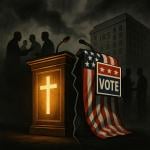
THE QUESTION:
Is gambling evil?
THE RELIGION GUY’S ANSWER:
Analysts anticipate a record high cash haul from the Super Bowl with the explosion in legalized online sports betting. The big weekend produced several interesting articles about the pros and cons, the inroads and innovations, of America’s gambling industry.
The Wall Street Journal’s Barton Swaim mulled religious aspects under the arresting headline “Would Jesus Bet on the Super Bowl?” He said that for Jews and Christians the Bible is “less than explicit” in warnings and yet its moral teachings do raise questions about gambling. Swaim sympathizes with theologians who oppose the desire to “get something for nothing,” accompanied by the attitude that work to earn necessary income “is a mostly unhealthy activity best avoided.” But he admitted that’s also the case when we inherit assets or the value of property increases regardless of our own efforts.
For Swaim, the key moral aspect is what gambling “reveals about the gambler,” especially desire or lust for wealth. The last of the Ten Commandments (Exodus 20:17) even forbids private inward thoughts of material desire or coveting, and Jesus warned in the Sermon on the Mount that “you cannot serve both God and money” (Matthew 6:24).
Yet another moral problem for Swaim is the fact that a certain portion of gamblers “will end up addicted and in financial and moral ruin.” More on that below.
Looking at Judaism, a Super weekend survey in The Forward noted that the late Rabbi Joseph Soloveitchik, the prime thinker for the “modern Orthodox” movement, denounced casino attendance and that’s the view of “pretty much every other authority” on Jewish law, before and since. Even the rabbis of Judaism’s liberal Reform branch have called gambling “non-productive and threatening to the social fabric.” A noted Jewish therapist says even seemingly innocent small bets can be a gateway to addiction.
Among Christians, there’s a notable split between tolerant Catholics and Protestants, who’ve been mostly hostile. The two largest U.S. Protestant bodies, which disagree on many things, are both resolute in opposition.
The Southern Baptist Convention has campaigned on the issue since 1890 and continues to believe gambling “must be vigorously resisted.” It agrees with Swaim’s points on something-for-nothing attitudes, materialism, and covetousness, and contends that “gambling seeks personal gain and pleasure at another person’s loss and pain.” It also decries the fostering of crime, public corruption, and “personal catastrophe.”
The United Methodist Church’s official Book of Discipline states that faithful Christians should avoid all forms of gambling, including public lotteries, casinos, raffles, Internet wagering, and other “games of chance,” even if proponents justify these as money-raisers for charities or useful government programs. It calls gambling “a menace to society, deadly to the best interests of moral, social, economic, and spiritual life, destructive of good government and good stewardship.”
Catholicism has a far more relaxed viewpoint, demonstrated in many parishes’ Bingo fund-raisers. The “Dictionary of Moral Theology,” edited by the then head of the Vatican’s highest tribunal, sidestepped all those Protestant worries and treated gambling as a pleasant “pastime” so long as games are fair and free of fraud.
But some are wary. “The Catholic Church views gambling as a legitimate form of entertainment when done in moderation,” the bishops of Massachusetts stated in 2014, but nonetheless they urged repeal of a pro-casino law for creating “a new form of predatory gaming” that preys on lower-income addicts “who can least afford to gamble.” Last year, the liberal Catholics for Equality said in light of Pope Francis’s teaching on responsibility to the needy it is “difficult to see how gambling of any kind can be justified.”
And there’s this. Until a 1983 rewrite, Catholic canon law specified that priests must shun “gambling games with risks of money.” This was counted among activities judged “indecorous” or “indecent to their state,” along with hunting, entering taverns, and bearing arms, except for “just cause” as approved by the bishop.
In Islam, the Quran explicitly forbids gambling alongside alcohol, partly as wisdom on personal finances and relationships. Verse 2:219 teaches that “there is great sin in both, and some benefit,” but “the sin is greater than the benefit.” Then 5:90-91 specifies, “You who believe, intoxicants and gambling, idolatrous practices and [divining with] arrows are repugnant acts – Satan’s doing; shun them so that you may prosper,” adding that “Satan seeks only to incite enmity and hatred among you.”
In other Super Bowl coverage, a Wall Street Journal business reporter exposed the industry over deceit (e.g. “risk-free” online betting), the ways odds are increasingly stacked against bettors, especially in “parlays” (bets strung together to promise bigger payouts), and the big rush and big risk with the huge increase in minute-to-minute bets placed during a game,
The current online sports excitement followed a big proliferation of casinos. A New York Times feature said competition from casinos operated by politically connected big business, and now the onrush of online betting, threaten the finances of Native American reservations that once profited from a virtual monopoly on casinos.
Other major media articles this past year have expressed alarm over the estimated 2 million Americans afflicted with either “problem gambling” or full addiction, which can wreck families and careers, mostly among people without riches to cover losses from their obsession. Yale University specialists say the gambling tide means between 2% and 7% of Americans are developing “gambling disorder” as youths.
Among sources for help and information:
National Council on Problem Gambling www.ncpgambling.org// and hotline: 800 – 522-4700
Gamblers Anonymous meeting locations and hotlines: https://gamblersanonymous.org/ga/
Gam-Anon, which advises families and friends of problem gamblers: https://gam-anon.org//
Yale research site: www.yalemedicine.org/conditions/gambling-disorder/
Mental health guidance from the non-profit HelpGuide:www.helpguide.org/articles/addictions/gambling-addiction-and-problem-gambling.htm/
Behavioral Health News analysis: https://behavioralhealthnews.org/the-impacts-of-problem-gambling/













